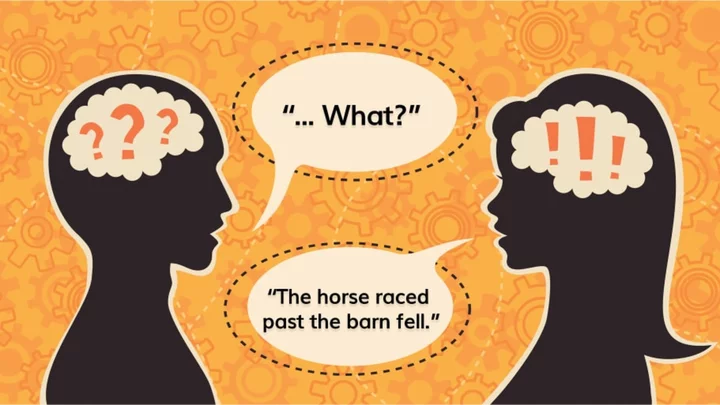Optical illusions have long captured our imagination, but what about linguistic illusions? A linguistic illusion is a phenomenon in which your judgment or understanding of a sentence or phrase conflicts with its actual meaning or structure. Like optical illusions, they reveal a little about how we process the world—and remind us that things aren’t always as they seem. Here are five that will have you questioning your grammatical intuition.
1. Garden Path Sentences
“The horse raced past the barn fell.”This is an example of a garden path sentence, one that has a fully grammatical reading but that tempts you down an ungrammatical side path. In this case, we initially read raced as the past tense (as in “the horse raced”), but raced is also a past participle, and in this sentence, that’s the correct reading (“the horse that was raced” [PDF]).
This is easier to see with an irregular verb like draw, which has distinct past-tense and past-participial forms: drew and drawn. Consider the sentence “The moth drawn to the flame died.” Here, drawn to the flame is clearly a modifier. We can omit it: “The moth died.”
Similarly, raced past the barn is just a modifier; the main sentence is “the horse fell.” Which horse? The one that was raced past the barn. At first we don’t go for that reading because a past participle is usually preceded by was or has, not a noun phrase like the horse. And so, we are led down the garden path by the seductiveness of the more common pattern.
2. Misnegation
“They had only just moved in; their boxes lay on the kitchen floor, still unpacked.”Most people read this sentence that nearly made it into The New Yorker and assume the boxes are full—but they are unpacked. Packing fills them and unpacking empties them. This is an example of misnegation, where a word or sentence is understood as having different polarity (positive or negative) than it really has.
In this case, something about the context led the writer to use a negative verb when a positive one was intended—and most readers are equally fooled. A similar example is “You cannot underestimate Shohei Ohtani.” Here, the negative cannot messes with our understanding of the direction of estimation. What is meant is that you cannot overestimate Ohtani: He’s even better than your most generous estimation.
3. The Comparative Illusion
“More people have been to Russia than I have.”Like Escher’s staircases, each part of the sentence above is fine—but follow it carefully and you end up going in circles.
In a normal comparison, we’d have something like “You’ve been to more places than I have __.” That gap is an important part of a comparative, indicating the nature of the comparison: the number of places visited. The motivating idea seems to be something like “most people have traveled more widely than I have.” But if we were to fill in the gap, we’d get “More people have been to Russia than I have been to Russia”—obvious nonsense. A more coherent sentence could be “More people have been to Russia than ___ have been to Uzbekistan.” In this case, the gap for have’s subject correctly corresponds to y, the smaller number visiting Uzbekistan.
In short, we can compare the number of places I’ve visited with the number others have, or we can compare the number of people visiting Russia with the number traveling elsewhere, but we can’t compare the number of people who have visited Russia with the fact that I have visited Russia.
4. The Licensing Illusion
“The authors that no critics recommended have received any praise for a best-selling novel.”Here’s another case where negative elements can throw a wrench in things. The licensing illusion occurs when a sentence contains negative elements like any that need to be licensed by a preceding negative element like no. “Nobody has any” is fine, but “I have any” is ungrammatical because any isn’t licensed. The sentence above has a no, fooling us into thinking that any is allowed [PDF]. Nope. Instead of “no critics … have received any praise,” it should be “The authors … have received … praise.”
5. The Missing Verb Effect
“The book that the student who the new catalog had confused a great deal was missing an important page.”At first, this sentence may seem to make sense, but at some point, you’ll likely realize it’s actually missing a verb phrase. In this case, the student is a subject looking for a verb, so adding something like was studying would complete the sentence and make it grammatical.
“The book [that the student [who the new catalog had confused a great deal] (was studying)] was missing a page.”
If you remove the part in bold, everything comes into focus: The book was missing a page. Which book? The book that the student (was studying). The confusion arises because of something linguists call “center embedding”—you can embed relative clauses at the end of a sentence ad infinitum, as in the classic nursery rhyme “This is the house that Jack built.” But when we try that in the center, it’s tough to deal with anything more than a single relative clause.
This article was originally published on www.mentalfloss.com as 5 Linguistic Illusions That Will Make You Go “Wait, What?”.









